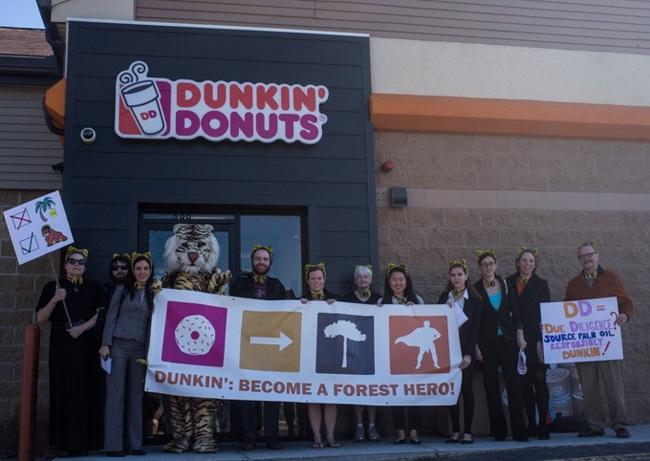
By Alexandra Stark
Forest Heroes, a group campaigning to prevent deforestation around the world, has urged Dunkin’ Donuts to adopt a responsible palm oil policy. Palm oil is primarily grown in Indonesia and Malaysia on land that has been deforested of ecologically rich rainforests – and it’s one of the primary ingredients in Dunkin’s doughnuts.
Because of deforestation for what the campaign calls “irresponsible palm oil,” there are fewer than 400 Sumatran tigers left in the world. That is why Forest Heroes organizers and volunteers gathered outside of Dunkin’ Donuts’ shareholder meeting a week ago, dressed in tiger ears and tails. They called on the company to commit to only using responsibly sourced palm oil.
Dunkin’ Donuts is currently working to develop just such a policy. At the shareholder meeting, company leaders assured the Forest Heroes advocates that they are working with the World Wildlife Fund to ensure that the new policy is strong, and noted that consumer interest in responsible palm oil sourcing is playing an important role in driving the company’s actions.
That’s good news for rainforests, but the details are important. Last year, Dunkin’ committed to only buying palm oil certified by the Roundtable on Sustainable Palm Oil (RSPO) by 2020.
“This commitment is too little, too late,” said Forest Heroes Campaign Director Deborah Lapidus. “Who knows if there will be any Sumatran tigers left by 2020 when it kicks in? And even then, the RSPO sets a notoriously weak standard, with major loopholes that still allow for deforestation and draining of carbon-rich peatlands, and has insufficient mechanisms for enforcement.”
In a report released last year called Certifying Destruction, Greenpeace stated that: “RSPO certification is not protecting international household brands from the risk that the palm oil they use is tainted with deforestation. RSPO standards are not prohibiting deforestation and peatland destruction.”
World Wildlife Fund, a co-founder of RSPO, issued a formal letter in April 2013 stating that “because the review failed to accept strong, tough and clear performance standards … it is, unfortunately, no longer possible for producers or users of palm oil to ensure that they are acting responsibly simply by using Certified Sustainable Palm Oil.”
Forest Heroes also says that the timeline is important and is calling on Dunkin’ to require suppliers to sell only deforestation-free and exploitation-free palm oil by the end of 2015. More than 9.7 million hectares of rainforest have already been licensed for palm production in Malaysia, and the Indonesian government has announced plans to convert about 18 million more hectares of rainforest into palm plantations by 2020 to meet rapidly increasing global demand for the product. In a recent Nature study, researchers at Stanford and Yale found that emissions just from expansion of Indonesia’s palm oil industry in Borneo could top 558 million metric tons of carbon dioxide by 2020 – more than all of Canada’s fossil fuel emissions. In addition to the Sumatran tigers, such deforestation would threaten endangered orangutans, which are only found in Indonesia and Malaysia.
Aside from environmental concerns, the palm industry has also been associated with abusive labor practices. Some actors in the palm oil industry have been singled out for being “rife with human rights abuses.” According to an investigative report by Bloomberg Businessweek, there are thousands of child laborers and “workers who face dangerous and abusive conditions,” including bonded labor and human trafficking, currently working on palm oil plantations.
Forest Heroes has worked with other major companies to go deforestation- and exploitation-free. In December 2013 Wilmar, one of the world’s largest palm oil traders, announced that it would no longer source palm oil and other commodities from companies engaged in deforestation or human rights abuse, and this February Kellogg’s agreed to only source palm oil from companies that meet similar “No Deforestation, No Exploitation” criteria by the end of 2015.
Forest Heroes hopes that Dunkin’ will go beyond the weak standards of the RSPO and be the next major company to commit to truly responsible palm oil. “'America runs on Dunkin' – which means it’s that much more important for Dunkin’ to become a forest hero,” Lapidus said.
Image credit: Forest Heroes
Alexandra Stark is a PhD student in Washington, DC. She is also a consultant for Catapult.
TriplePundit has published articles from over 1000 contributors. If you'd like to be a guest author, please get in touch!














